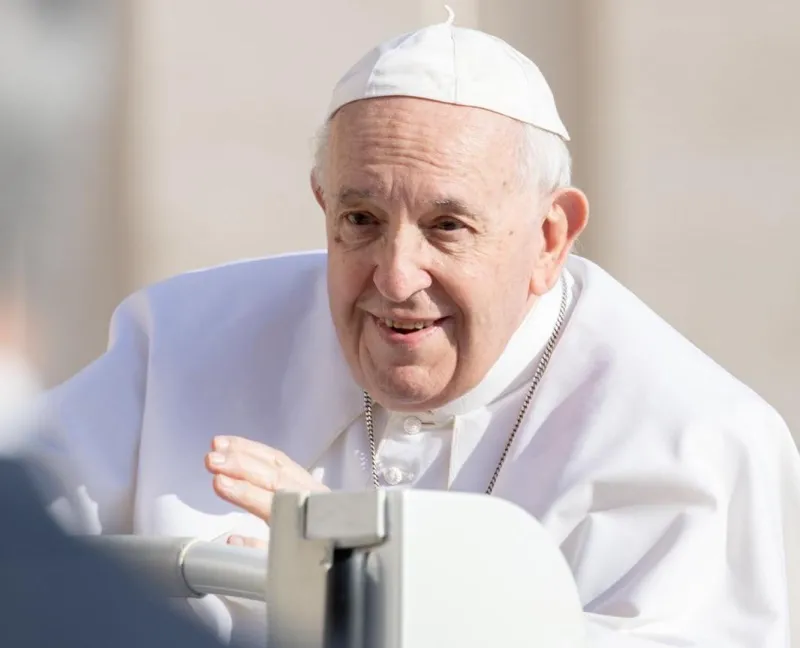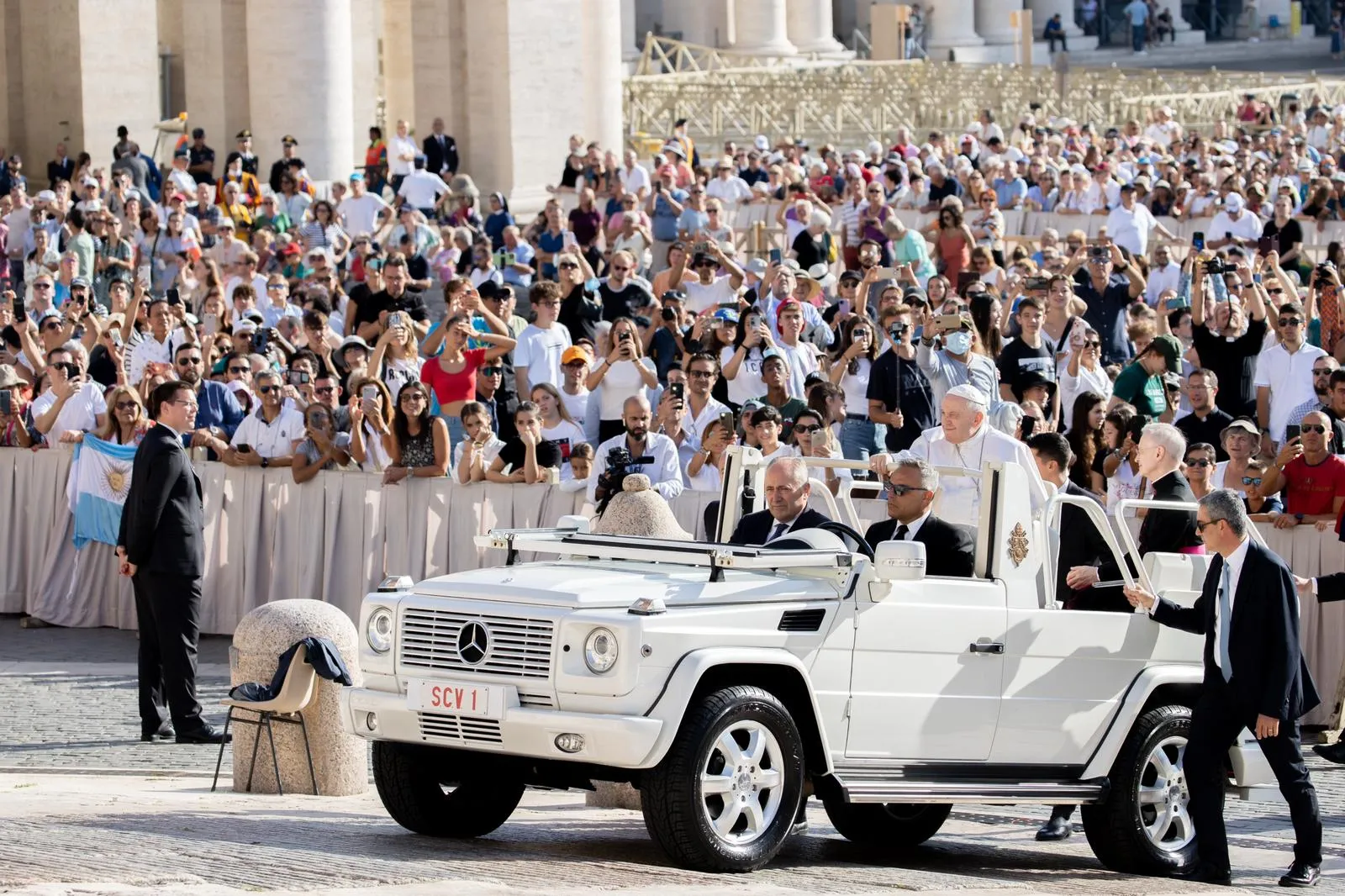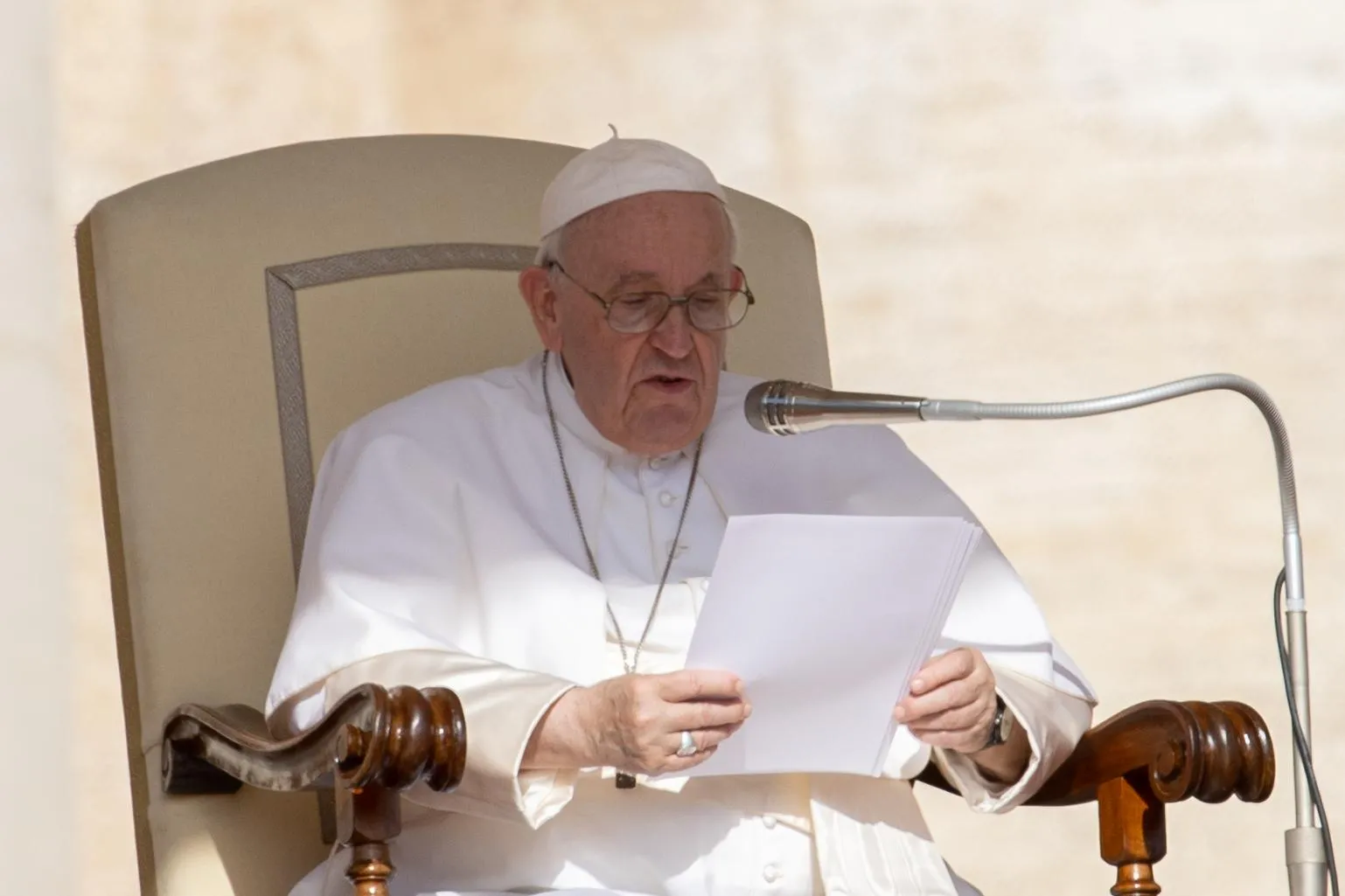
ACI Prensa Staff, Oct 16, 2023 / 18:00 pm (CNA).
José Miguel Gómez Rodríguez, the archbishop of Manizales in Colombia, shared his experience at the Synod of Synodality taking place this month at the Vatican, commenting on what this assembly can ultimately give to the Catholic Church and stressing that it “cannot remove pages from the Bible.”
The Synod on Synodality was announced in October 2021 with the theme “For a synodal Church: communion, participation, and mission.” Participating in the session taking place in Rome this October are 364 people including bishops, religious, priests, deacons, and laypeople. For the first time, non-bishops — including 54 women — will have the right to vote.
In an interview with ACI Prensa, CNA’s Spanish-language news partner, the archbishop of Manizales responded to the question about whether the synod could approve the blessing of homosexual couples and the ordination of women: “No, but the Church already knows that answer.”
“Before the synod, a few days before, they published the pope’s answers to some questions or doubts that some cardinals had raised and there are also these questions, in such a way that what the pope wants is for us to handle with great respect and great delicacy the questions that people have in their hearts and that we answer them with so much respect that no one is offended, that everyone has clear in their minds the why of things,” Gómez explained.
The Colombian prelate emphasized that “the synod cannot remove pages from the Bible, the synod does not have that kind of authority, nor does the pope remotely want that.”
“There is bad press against the Holy Father that’s not fair and that has as its objective the same thing that they try to do in the world, which is class struggle. They want to divide us Catholics from the pope and the pope from Catholics,” he warned.
The beauty of the Church
Regarding the topics discussed at the synod, the archbishop noted that many of these “have their origin in the desire for the Church to wake up a little more, for Catholics to not only discover the beauty of the Gospel, but the beauty of participating in the Church.”
That is why, he continued, “the three big blocks of questions are called communion, participation, and mission, but there are also other questions that, to be honest, it seems to me that the pope wants us to put before our eyes, and they are those that sometimes come from certain groups, groups that sometimes shed light on themselves that they would not like to have, but that they themselves are responsible for projecting on themselves, to vindicate themselves for one thing or another.”
“These issues, of course, the synod is facing with respect, with a lot of dignity and a lot of charity,” he stressed.
Universality
Regarding his personal experience at the synod, the archbishop told ACI Prensa that the first thing he has experienced is “admiration for what is always seen at synods. This is, thanks be to God, the second one I am able to attend. The first was on the word of God. I remember that also on that occasion what surprised me most was seeing the universality of the Church, seeing the bishops from all over the world.”
A second aspect he noticed is that “the Holy Spirit is really working. Incredibly there is agreement on some things that we would not have been able to agree on from our countries of origin, considering that many of us did not even know each other. And we have very great agreement in terms of emphasis, what to insist on, suggestions. Very interesting things have come out.”
What can the Church expect from the Synod of Synodality?
When asked what the Church can expect from the Synod on Synodality, Gómez responded: “What I think we can expect from the synod is that it puts us all to work on the same task.”
“We have been seeing for many years an enormous mass of Catholics who don’t seem to be interested in the very life of the Church, for a long time thinking that the Church must be done by priests” and priests need to address that, the archbishop continued.
The Colombian prelate finally remarked that “the time has arrived when we all have to ask ourselves ‘What is up to me to do?’, and I believe that that is synodality.”
Gómez was born April 24, 1961. He was ordained a priest on Feb. 2, 1987.
He has been the director of the Department of Catechesis and Biblical Pastoral Ministry of the Standing Secretariat of the Colombian Bishops and professor of sacred Scripture at St. Joseph Major Seminary in Bogotá.
In November 2004 he was appointed bishop of Lebanon-Honda and was consecrated a bishop on Feb. 5, 2005. In February 2015 he was appointed bishop of Facatativá, where he served until April 2021, when he was named archbishop of Manizales, his current position.
This story was first published by ACI Prensa, CNA’s Spanish-language news partner. It has been translated and adapted by CNA.
If you value the news and views Catholic World Report provides, please consider donating to support our efforts. Your contribution will help us continue to make CWR available to all readers worldwide for free, without a subscription. Thank you for your generosity!
Click here for more information on donating to CWR. Click here to sign up for our newsletter.









They know they can’t remove pages from the Bible. They just say the teachings of the Bible are too hard for some to live in their “complex situations” and thus say we have to make exceptions to the “norm” while at the same time saying the teachings haven’t changed.
Hi, dear ‘JP’: “They just say the teachings of the Bible are too hard .”
You are spot-on: effete church ‘leaders’ see nothing wrong in incorporating the ungodly in The Church, aiming for the numbers, money, & influence that counterfeit recruits are all too willing to supply.
Yet, King Jesus Christ (see Matthew 7:13-14) made it clear that His followers must accept the hardness of The Way that He leads us on. The alternative, easier, popular way leads only to destruction.
Good men & women have never been put off by the prospect of picking up their cross daily to follow our beloved LORD. That is the truth about how things have to be in this world. No one can alter that, not even a pope.
Perseveringly seeking to follow Jesus Christ (a lifetime’s occupation) has always brought out the best in us. This is how God created it to be!
Catholics’ faithfulness to The New Testament, be it ever-so hard, is what invites The Holy Spirit of God to confront the sinful world (John 16:8-11), and that is the whole reason for the existence of The Church.
They lie perniciously in saying: “The Church exists to make the world a better place.”
What is it about Christ’s superb plan that so many church hierarchs are choking on? Why do they sell out for a tawdry and futile impost?
Ever blessed by The Lamb of God; loving prayers from marty
In other words, we don’t dare urge anyone to repent these days (no matter how tactful and prudent we may be). I guess we are to simply “accompany them” as they persist in the mortal sin(s) that can possibly lead them to Hell. 🙄
Say orthodoxy, live heteropraxy.
If the Church preceded the Bible, and if in fact the Bible is the creation of the Church, then it seems to me that the Church can do what She will with it.
.
That would be an incredibly stupid thing to do, but it seems it could be done.
Ah, but the Church did not precede the Word of God, nor can she do with the Word of God what she will (cf CCC 104).
The Bible and The Word of God are not the same thing.
“In Sacred Scripture, the Church constantly finds her nourishment and her strength, for she welcomes it not as a human word, ‘but as what it really is, the word of God’…” (CCC 104)
“For the Sacred Scriptures contain the word of God and since they are inspired, really are the word of God…” (DV 24)
But the Word is Christ, is it (He) not? The Bible refers to that in the Gospel of John.
The Old Testament was written over a long span of time before Christ was born. The New Testament after He died. Actually, there were many “books” written before and after, and somebody (or rather somebodies) had to make a decision on what was to be canon and what was not.
https://www.catholic.com/qa/who-compiled-the-bible-and-when
Come to think of it the Catechism is much the same. There have been many different versions.
I disagree with removing pages from the Bible, but I just don’t see why the Church could not do it.
Mrs. Hess, the Book of Genesis is part of the Bible. It preceded the institution of the Church.
I refer to the Bible as a whole, not individual books
The fact that he would feel obliged to say such a thing is quite disturbing.
What kind of pressures can he be experiencing that would prompt him to even contemplate a Church event that would contravene the Gospel of Christ Jesus?
THIS is a very positive and affirming commentary. Very welcome to this reader. And, we also read a warning: “There is bad press against the Holy Father that’s not fair and that has as its objective the same thing that they try to do in the world, which is class struggle. They want to divide us Catholics from the pope and the pope from Catholics.”
Only “in the world?”
Yours truly recalls in 1994 pointing out this Marxist problem, even within the Church itself, to a visiting priest with a permanent teaching position in Rome. Academically insulated—and now open-mouthed, he had never even thought of it. Ever.
The CONCERN by some is the degree to which synodality in its current formulation might be too welcoming to a populistic and amnesiac vanguard, “walking together” with the “bad press” agenda? Why, for example, is the “non-synod” (!) Synodal Way even at the Synod table in Rome, and already distributing its script? How much of a “paradigm shift” does it take to divide the magisterium and the “hierarchical communion” from itself? Not by simply removing pages from the Bible, but by removing the Church of today from itself (Lumen Gentium)—from even the idea of Tradition, including the accountability and historical fact of the apostolic succession (Mt 28:19-20)?
The subtle AND possibly fatal difference between the “gospel values of Jesus” and the concretely incarnate “Christ of the gospels”—”the same yesterday, today and forever” (Heb 13:8)? With the Holy Spirit not only somewhere out there ahead of us, but already and first indwelling the Church—from the beginning—ever since Pentecost.
TODAY, the mingled risk of intuitionism, and the rescheduled and fictional Third Age of the 12th-century Joachim of Fiore? Or, Pentecost? But hopefully, too, with Archbishop Rodriguez: “the Holy Spirit is working…
“They [bad press] want to divide us Catholics from the pope and the pope from Catholics,..” No.
What divides Catholics is Vatican perverting and subverting of VCII documents. What divides are attempts to paradigmatic shift Church teaching. Undermining and reorienting doctrine to ‘pastorality’ through documents like Amoris, Fratelli, Traditiones Custodes, and Laudate has divided Catholics. Including laity with progressive ideology and non-bishops as voting members in this synod is emblematic of an assault on a teaching and valid synod. Disallowing “good press” sets the agenda and outcome of this papacy’s divisive synod front, center, and in absolutely clear focus.
Counterfeiting, denying, obfuscating, and facilely trying to convince that it has not damaged, stolen, buried, or thrown away any of the Church’s treasure, Rome fools no one of its divisive cause celebre.
Rome has shredded her credibility. Orthodox Catholics detest lying and obfuscating words. We want words of Christ, not of false teachers and their false spirits. Our few good shepherds are persecuted, ignored, ridiculed, denied welcome among the false and so we see abomination in the heart of Rome.
The Church is the Lord’s, and he holds Her dear. True believers fear Him. No one else frightens us.
Communion. CNA’s Sanchez Silva refers twice to the Synod on Synodality’s original 2021 theme, Communion, Participation, and Mission.
Communion within the Church, our bond with Christ is Christ himself in the Holy Eucharist. Today, the feast of a great father, martyr for Christ St Ignatius of Antioch speaks to that bond understood by Ignatius as Christ, who speaks to “deep within” him, “Come to the Father. I no longer take pleasure in perishable food or the delights of this world. I want only God’s bread, which is the flesh of Jesus Christ, and for drink I crave his blood, which is love that cannot perish”(Ignatius in a letter to the Romans). For Ignatius Christ was alive within. He speaks of Christ as the living, resurrected Christ, much like the Apostle Paul. Ignatius was a friend of Bishop Polycarp, a brother martyr saint and apparently according to historical sources, a student of the greatest of the Apostles.
This martyr’s love is consistent with the living presence of Christ in the Eucharist. As the crucifixion was Christ’s absorption of the death penalty we deserved, his resurrection was evidence of our forgiveness. As the Apostle says if Christ had not risen from the dead our faith would be useless. Augustine centuries later would trace that perception in the Fathers calling the resurrection God’s most marvelous work.
Among the faithful there’s a weakness of this awareness of the risen, living Christ, received and alive within us at Holy Communion. It was fitting beyond measure that communion is mentioned first in the original theme. The challenge now is for the conceptual Synodal Church to realize that participation with Christ and our true mission is revealed in the Eucharistic presence of the living Word.
“…our bond with Christ is Christ himself in the Holy Eucharist.” In a Letter to the Ephesians, St. Ignatius of Antioch also finds of the Church a Eucharistic unity:
“…for you are as united with him (the bishop) as the Church is to Jesus Christ, and Jesus Christ to the Father, so that all things are in harmony through unity” (St. Ignatius, Letter to the Ephesians, Liturgy of the Hours, Second Sunday of Ordinary Time).
Harmony through unity, rather than unity through editing. Wondering, here, how the “experts” of the Synod will put their Humpty-Dumpty facsimile together again?
Fr. Morello, Thank you for what you have said in this post about the Resurrection. I recently bought and placed a picture of the Holy Face placed beside the Divine Mercy picture and alongside the Eucharist and the Crucifix in our Eucharistic prayer Chapel.I also bought and placed a large statue of the Risen Christ right beside the Eucharist on a separate table. We must have all of Christ. Without the Passion there would be no Resurrection and Divine Mercy. All was done with the parish priests permission.In the Resurrection Christ overcame death and carved a path through it for us to follow Him to Heaven and now I understand it as His sign of forgiveness. Beautiful. If you see I misunderstand any of this please offer me your correction. In JMJ, Diane McHenry
What about all the parts of the Bible we do ignore?
Dear ‘Sher’, was wondering who is the ‘we’ you refer to?
The Catechism of the Catholic Church does a great job in highlighting & explicating the various books of The Holy Bible and the inspired works of our early saints.
Appropriately (since Jesus Christ is One with God The Father & God The Holy Spirit, is The Beginning and The End of all things, & The Reason that all things exist), the CCC majors on HIS life example & HIS instructions by building itself on over 3,500 citations from The Holy Spirit-inspired Apostolic witness of all 27 texts of The New Testament.
You may be right if you mean that many Catholics – both clergy & lay – are shockingly ignorant of The New Testament, having never been informed that it is the very Charter of God’s New Covenant with humanity, the most important text in the entire cosmos.
Perhaps good Catholics have been put off by the faith-destroying & obfuscating ‘scholarship’ of many modern & postmodern, catholic, New Testament academics, who are in breach of the faithful hermeneutic of our Catechism and doubly sin, in betraying Truth and in obstructing & misleading Christs’ little ones.
We really have no excuse. In every Holy Mass that we participate in, the priest and the people all rise to welcome The Gospel with loud Alleluias, and we declare: “Praise to You, LORD Jesus Christ!” Then with serious intent we sign our foreheads with The Cross to declare we believe Christ’s Word, sign our lips in promise to ever declare Christ’s Word, and sign our hearts to say how we will love Christ’s Word above all.
Hopefully, the shock of the present PF-inspired anti-Apostolic crisis in The Church will awake us from our spiritual laziness and sponsor a desire among all Catholics to become thoroughly au fait with The New Testament, personally & parish-wide.
Ever under the glory of God’s Word, King Jesus Christ; love & blessings from marty